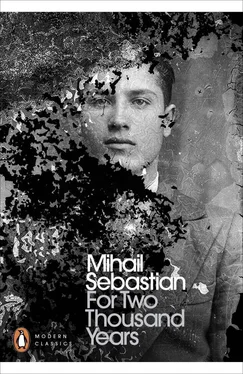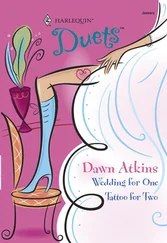And what am I anyway? A machine for arguing? What will this man say to me? What will I say to him? Who will arbitrate between his truth and mine? What is the point of all this wasted time, all this hot air? What’s the point, if you end up back against the same dead-end questions, with that same stubborn sadness? An argument, a hundred arguments, a million — to hell with them all.
We went in. A big, empty room with a few wooden benches and — on the walls — a few photographs, Palestinian scenes probably. Some twenty girls and boys of between fourteen and sixteen years old were sitting around an older boy, listening to a story. They were speaking fluent Hebrew, which surprised me at first (I hadn’t known it could be spoken easily, colloquially) and then made me feel awkward. I understood nothing and felt like an uninvited guest. However, the older boy, the one telling the story, made a welcoming gesture and, as we approached the group, I realized with surprise that this child, this adolescent, had to be our man, the Palestinian missionary. While he gestured expansively with his left arm as he narrated, almost singing, his right sleeve was empty to the shoulder, tight against his body and tucked into his pocket.
In amazement, I ran over everything Winkler had told me about him on the way, watched again as if seeing brief cinematic images of his flight from Russia, the prison in Kiel, the crossing of the Atlantic, refuge in Haifa, the years of work in the colony, and I asked myself where this man with the cheeks of a child kept his scars and memories hidden …
When he had finished his story, he approached me and Winkler, extending his undamaged left hand and asked in clumsy French if we didn’t mind waiting half an hour until he had finished with the children.
‘In the meantime, join the circle.’
I hung back. The game seemed rather silly to me, but hesitating seemed even sillier, intimidated as I was before the kids.
‘What the hell, I’m not that old,’ I told myself, and two young pupils made space for me.
Our Palestinian friend, always in the centre of the group, was now teaching us a Yemeni song. He would say a verse and the kids had to repeat it after him, first speaking it out loud, then singing it together. I kept quiet at first, but he stopped the whole choir after the first few words.
‘That’s no good: everybody has to sing along.’
I blushed, feeling myself singled out, but kept quiet. He insisted again, in a good-tempered, comradely way.
‘Somebody here doesn’t want to sing. It seems he’s annoyed with us — what other explanation can there be for not wanting to sing? Let’s all ask him to sing, then I’m sure he will.’
Anything but that. I’ll do what they want, sing if they want, do cartwheels, tumble, roll head-over-heels if I have to, just don’t all stare at me like that, like a bad student caught copying and put in the corner in front of the whole class. So I sang.
S.T.H. should have been there to see me. He would have roared with laughter. Recalling it, I feel rather embarrassed — wrongly in fact and fussily — for — why should I be ashamed to say it? — it was a pleasant hour, an hour of holiday, in which I was conscious of doing a thousand silly irresistible things, things more powerful than ‘my critical spirit’, more powerful than my fear of being ridiculous.
In the middle of the room, with a lock of hair falling over his forehead (as he conducted us by nodding to the beat), with a wide smile lighting his adolescent face, our man managed to get us playing in the end. By the time we were leaving, I’d forgotten that we’d gone there to debate ideas. He came up to me and shook my hand again.
‘I don’t have anything else to tell you. I wanted you to sing and you sang. That’s all there is to it.’
And that really is all there is to it. Can you sing? You’re saved.
Well, I for one can’t sing. I am discreet, have a critical disposition, a sense of the ridiculous, self-control, and other tragic nonsense of that kind, and possess the supreme folly of self-regard. Yes, indeed, at precisely the moment you hide behind your own penmanship, writing what you think is a confession and a severe internal reckoning, somebody within creeps up and claps you on the back and decorates you with the order of merit, first class. I write here plainly and in good faith that I’m an unfortunate fool and meanwhile a voice secretly consoles me. ‘You’re a martyr,’ it says, ‘the hero of your own destiny, the guardian of the purest values of human dignity.’
The duplicity of humility and pride, which frustrates all my sincerity … There’s no cause that I haven’t undermined, no revolt against myself that I haven’t annulled with a small hidden reserve, with a prearranged excuse.
And still I believe, I want to believe, I am convinced that my inability to sing is an infirmity, not a mark of nobility. I believe this inability to join the crowd — any crowd — to cast myself into the throng, to forget myself and lose myself there, is a sad failure, a sad defeat.
If I could only not be proud of this. If I could achieve only that …
I hadn’t seen Abraham Sulitzer, my old Ahasverus, since that meeting on the train in the Christmas holidays. And now, our paths cross. It’s extraordinary how opportunely people enter and leave my circle, as if directed by an argument that calls them closer or pushes them away, depending on whether they are required or not. Life has this kind of aptness, which is not allowed in literature. Were I a man of letters, I think the hardest thing would be to mask the unbelievable twists of reality, which show such daring and initiative … (But what is this thought doing here? I’ll tell it to Walter. He, as a critic and newspaperman, could at least put it in an article.)
It turns out that Abraham Sulitzer is my neighbour. He lives a hundred metres away, to the left, in an alley that opens on to my street. But because he heads out for work at seven in the morning and I closer to nine, an age has passed without us intersecting. Yesterday, though, I had to get to the train station at dawn (a package sent home through Lulu) and on the way back I turned a corner and bumped into my friend Abraham.
‘I saw you last week at Jabotinski’s conference and wanted to call out to you, but thought better of it. Who knows? I thought, maybe he’s forgotten me. A bookseller he met once on a train … But I wanted to ask if you’d read Şapsă Zwi’s history. It’s a book I was fond of.’
I reassured him somewhat, telling him that it had interested me greatly. But I’m sure my reply did not please him. (What was ‘It interested me’ supposed to mean? A book either knocks you down or raises you up. Otherwise, why pay money for it?) Abraham Sulitzer certainly thinks this way, but doesn’t say it out loud. He just smiles, full of reticence and eager amiability. (Well? Didn’t you like it? Let’s say, as you do, that you found it interesting. Well? Aren’t you entitled to? Perhaps I can do something for you …)
We separated quickly — we were both in a hurry — but he invited me to visit him some evening — an invitation I accepted with pleasure.
*
Books, books, everywhere books. I’ve seen people talking to their cats, their dogs … Abraham Sulitzer talks to his books.
‘Come down here to Papa, third in line. Easy, now, don’t wreck the whole row. Who’ll put you back in place if you do? You? The hell you will. It’s always me. And who does Roza shout at? Also at poor me!’
Mr Sulitzer exaggerates. Roza, his wife, doesn’t shout: at most she grumbles.
‘Lord,’ she complains to me, in that same lilting Jewish-Moldovan as his, ‘I have brothers too, and brothers-in-law, who are salesmen. One sells bobbins, another sells boots. And? They spend the day at the shop, and shut up shop in the evening — and that’s the end of it. Does anybody take their bobbins home to sit and talk to them?
Читать дальше












